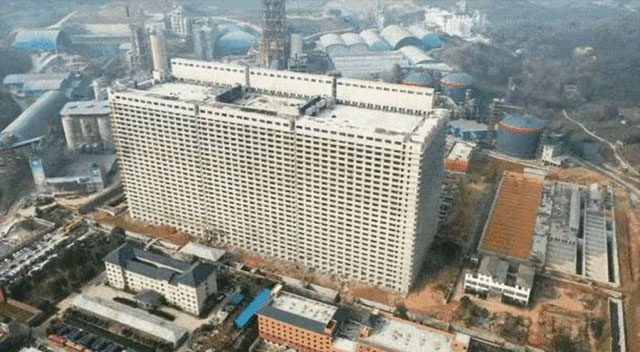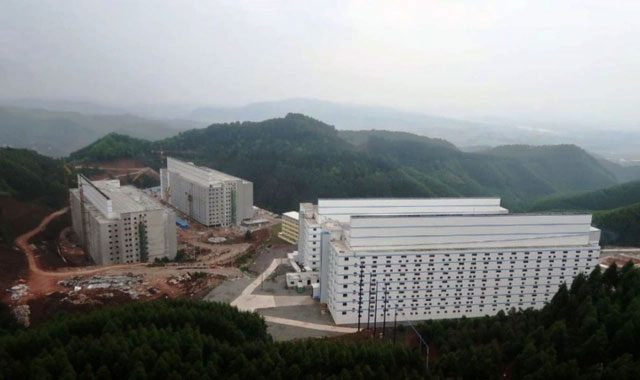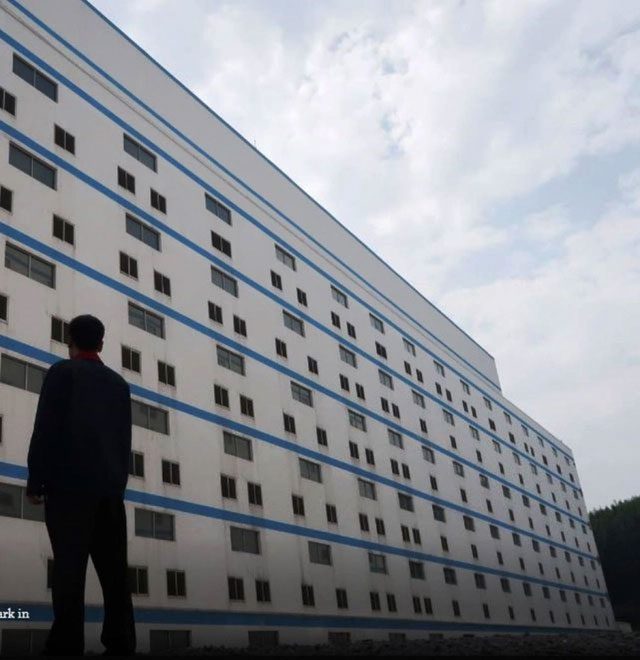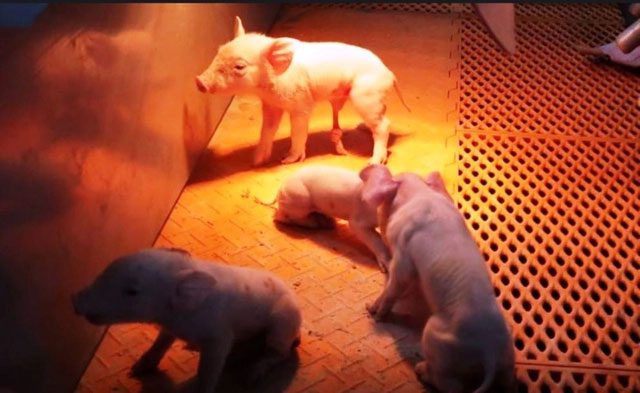In Yichang (Hubei, China), there is a 26-story building constructed for pig farming.
A new high-rise building in Hubei Province, central China, is being promoted as the “tallest pig farm in the world”, set to house tens of thousands of pigs as companies seek to modernize the livestock industry and meet the growing demand for pork in the populous nation.
“Pig Hotel”
The 26-story farming facility gained attention after its owner, Hubei Zhongxinkaiwei Modern Farming Co. Ltd., announced it would begin operations at the end of August, according to Chinese media. Located in Yichang city, the farm features two buildings, each covering 400,000 square meters, and will be equipped with automatic feeding machines, air filtration systems, and smart deodorization technology.
In recent years, local farmers have started raising pigs in multi-story buildings—sometimes referred to in Chinese media as “pig hotels”—instead of traditional single-story farms. According to estimates from a leading Chinese livestock equipment supplier, the area of pig farming high-rises has increased by 30% annually over the past two years, as producers strive to better meet the country’s pork demand.

“Pig Hotel” in Yichang, Hubei Province. (photo: Weibo)
According to official estimates, China is the world’s largest producer and consumer of pork, with demand expected to rise from 51.77 million tons to 60.77 million tons over the next decade. Large farms are racing to meet the increasing market demand, which places a higher value on pork compared to other meats.
Zhongxinkaiwei stated that their farm in Yichang is expected to produce 54,000 tons of pork annually from a herd of 600,000 pigs across the two buildings. The company claims that once construction is completed, this will be the largest pig farming site in China.
The practice of raising pigs in high-rise buildings surged after an outbreak of African swine fever wiped out half of the country’s pig population in 2018. This disease led to record-high pork prices and the closure of countless small traditional farms.
To mitigate the risk of disease spread, the Ministry of Agriculture and Rural Affairs of China has classified the country into five geographical zones since 2021 and recommended against transporting livestock across regions, while local authorities encourage increasing local capacity to meet demand. Previously, in 2019, the Ministry even lifted restrictions on the construction of multi-story pig farms.
While the idea of building more “pig hotels” sounds promising, some industry professionals have expressed concerns.
Zheng Zhicheng, PR director of New Hope Group, told the Southern Weekly that while “pig hotel” buildings may help reduce land-related costs, production costs are higher compared to traditional pig farming methods. He also warned that internal biosecurity issues are more challenging to manage and could lead to significant losses in the event of an outbreak.
Zhongxinkaiwei is not the first company to envision pig farming in high-rise buildings. Since 2018, before the COVID-19 pandemic, thousands of pigs were raised on each floor of a “pig hotel” operated by Guangxi Yangxiang Co. in the Yaji Mountains of southern China.
According to Reuters, China is not the only place experimenting with high-rise pig farming. Two- or three-story pig farms have been tested in Europe. Some are still operational, others have been abandoned, but a few new ones have been constructed in recent years due to management difficulties and public opposition to large, intensive farms.
As China intensifies the industrialization of its massive pig farming sector, part of a 30-year effort to modernize agriculture and create wealth in rural areas, companies are experimenting with high-rise housing for pigs despite the costs. These “hotels” indicate that some investors in the livestock sector are willing to go to great lengths as China “overhauls” its farming models.
Xu Jiajing, a farm manager at Yangxiang, stated: “There are significant advantages to building a high-rise pig farm. It saves energy and resources. The land area is small, but you can raise many pigs.“
Companies like Yangxiang are investing more in high-rise farm projects, even though the construction costs of such farms are approximately 30% higher than those of modern single-story farms—despite the fact that at the end of 2018, pork prices in China were at their lowest in eight years.
For some, these investments are too risky due to concerns that diseases can easily break out and spread in such intensive farming conditions.
However, the success of high-rise pig farms in China could impact densely populated, land-scarce regions in Asia, as well as equipment suppliers.
Peter van Issum, CEO of Microfan (Netherlands), which designs ventilation systems for Yangxiang, said: “We are seeing an increasing demand for building two- or three-story farm buildings in China.”
Microfan also provides equipment for Daedeok JongDon GGP Farm, a three-story pig farm in South Korea.
“These high-rise farms are still rare, but the future could change rapidly,” Mr. van Issum added.
“Sky-High” Farm
The Yaji Mountains appear to be a challenging location for constructing a massive pig farming operation. Driving up a narrow road, away from nearby villages, the concrete buildings overlook a lush forest valley, where Yangxiang plans to develop a tourist attraction.

Pig farming in the Yaji Mountains
This site is relatively close to Guigang, a city with river and waterway connections to the Zhujiang River Delta, one of the most densely populated areas in the world.
While China is encouraging more livestock farming in the country’s northeastern grain-producing regions, many worry that farms there will struggle to safely transport pork to major cities thousands of miles away.
This reality has spurred some farm investments in southern provinces like Guangxi and Fujian, which, while hilly, are closer to many of China’s largest cities.

A Yangxiang worker stands in front of the company’s high-rise pig farm
Yangxiang began raising 30,000 sows on an 11-hectare site at the end of 2018, producing 840,000 piglets annually. This is the largest, most intensive pig farm in the world. For comparison, a typical large pig farm in northern China usually raises 8,000 sows on about 13 hectares.

Pig farming at Yangxiang’s high-rise farm
In Fujian Province, Shenzhen Jinxinnong Technology Co., Ltd. is also planning to invest 150 million yuan (24 million USD) into two five-story sow farms in Nanping. Two other companies are also constructing high-rise pig farms in Fujian.
The Thailand-based integrated livestock group “from farm to retail” CP Foods is also collaborating with China’s Zhejiang Huatong Meat Products Co. to build four six-story pig farming buildings in Yiwu, a city near the “megacity” of Shanghai.




















































